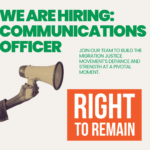Sipho Sibanda is a migrant rights activist in Northern Ireland. This article is cross-posted with kind permission from Slugger O’Toole.

(Credit: History Hub)
Progress since the civil rights movement in Northern Ireland should not be understated. The decline of religious discrimination in areas such as employment, housing, voting rights, and education is considered one of the crowning achievements of the last 50 years.
However, asylum seekers and migrants in Northern Ireland today face a host of curtailments to their rights. Many of these rights are the same as those which were at the crux of the movement 50 years ago: the right to work, to vote, to housing, education, and not to be detained.
Asylum seekers are not allowed to work while their claims are processed, which can take years. This further affects a person when they finally get their status, as it means they have been out of employment for a long time and are deskilled.
People that come to seek refuge find it very difficult to access university-level education, as they cannot access any loans or grants and must pay ‘international’ fees. This is starting to change only recently with Queen’s University Belfast and University of Ulster offering 2 and 3 spaces respectively to asylum seekers. For many, the Belfast Metropolitan College has been the only place where asylum seekers have been able to access some kind of tertiary education. Even with this, many courses need to be paid for through charity as asylum seekers can’t access the educational grants available to local students.
A lack of access to housing is one of the most important issues. Many migrants, including from the EU, are barred from accessing social housing or housing assistance. The housing provided to asylum seekers on a ‘no choice’ basis has been described by a group of cross-party MPs as a ‘disgrace’. This is especially problematic when racial attacks or harassment are involved. When we become homeless, we are barred in law from getting any help.
Migrants also feel threatened whenever they travel between Northern Ireland and Britain, as one is always stopped and checked. Unfortunately this usually comes down to racial profiling – it is done only to people of colour. Migrants have found themselves being detained when traveling down south, where every other Northern Irish resident goes to without any problem for there is no physical border.
And while internment without trial was ended decades ago, migrants and asylum seekers living here can, and do, find themselves locked up arbitrarily and without time-limit in detention centres, such as in Larne.
Most migrants are barred from exercising a most fundamental democratic right; to vote in assembly or even local elections. Thus we make our voices heard through other means.
Those of us who have come here, be it looking for refuge or to start a new life, should be allowed to work and integrate properly into their communities. We should be allowed to travel freely without fear, and be granted equal opportunities in education so we can further our studies and contribute more to society. The civil rights struggles of the past have improved the lives not only of those who were denied those rights, but also society as a whole. We are only asking for the same rights to be extended to us.
















Discussion: